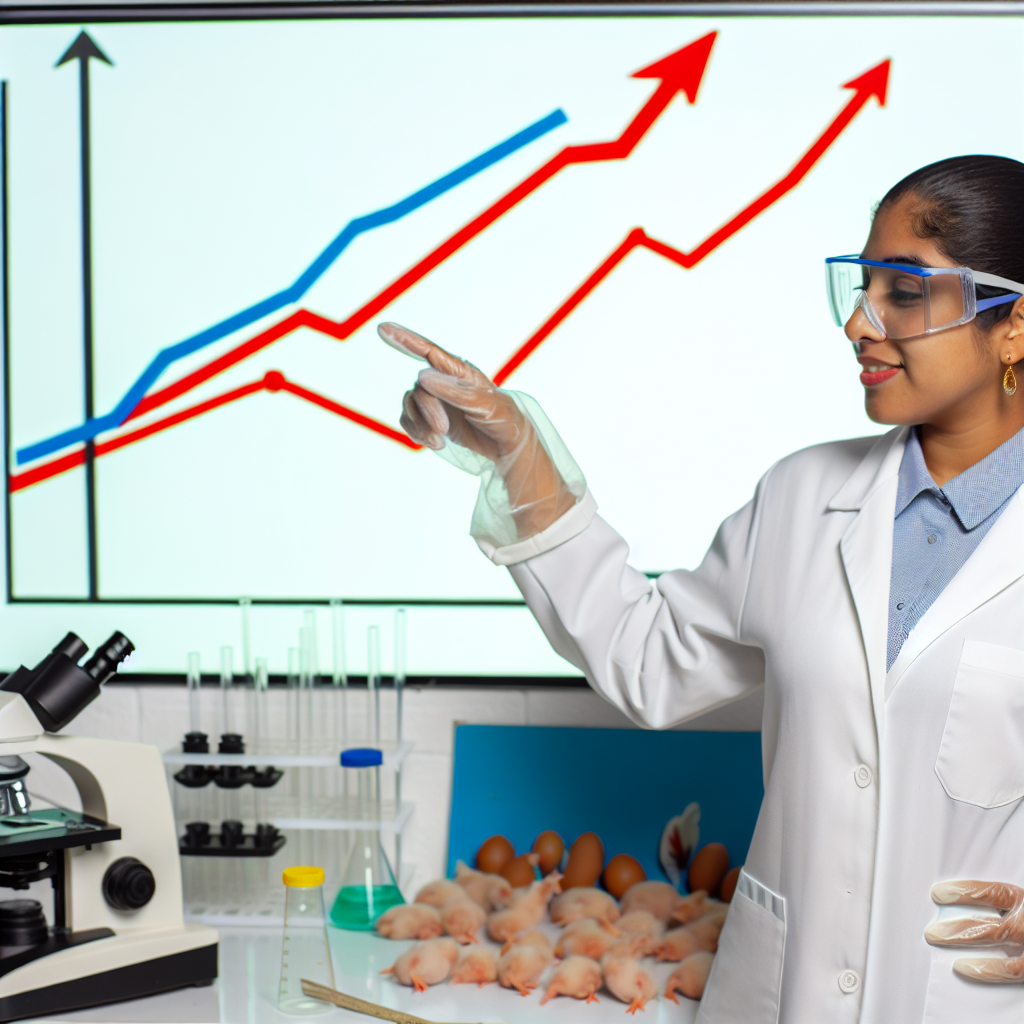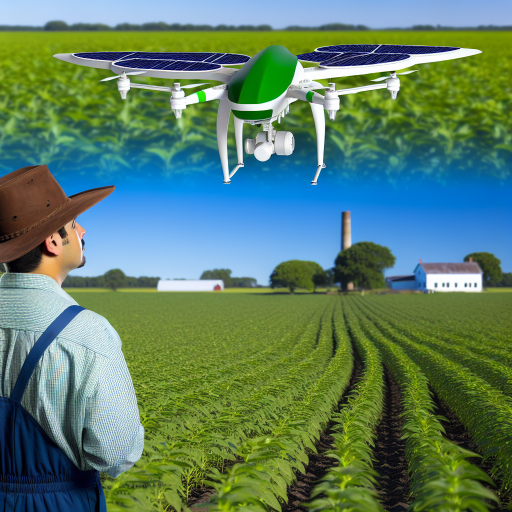Introduction:
Poultry farming plays a crucial role in the agricultural industry by providing a sustainable source of protein.
With the evolution of poultry farming techniques, the industry has seen significant growth and expansion.
This growth contributes to the economy.
Current trends in poultry farming:
- Discussion on the use of technology such as automation and data analytics.
- Emphasis on the shift towards organic and free-range poultry products.
- Mention the growing demand for specialty poultry products like quail and duck.
Technology in Poultry Farming:
Automation has revolutionized the poultry farming industry.
It has made tasks such as feeding, watering, and egg collection more efficient and accurate.
Data analytics is being used to monitor bird health and optimize production processes.
Shift towards Organic and Free-Range Products:
Consumers are increasingly looking for organic and free-range poultry products.
This demand stems from concerns about animal welfare and food safety.
Poultry farmers are responding by transitioning to organic and free-range practices.
Specialty Poultry Products:
There is a growing market for specialty poultry products like quail and duck.
These products are seen as gourmet options.
They are popular among consumers looking for unique flavors and experiences.
The Role of Poultry Scientists:
- Research and development of new technologies and practices for poultry farming.
- Conducting studies on nutrition, genetics, and disease prevention in poultry.
- Providing training and education to poultry farmers on best practices.
Research and Development:
Poultry scientists play a critical role in developing new technologies and practices.
They strive to improve productivity and sustainability in poultry farming.
Research topics include housing systems, feed formulations, and disease management.
Nutrition, Genetics, and Disease Prevention:
Studies on poultry nutrition, genetics, and disease prevention are essential.
Such studies maintain the health and welfare of birds.
Poultry scientists optimize diets, breeding programs, and vaccination strategies.
Training and Education:
Poultry scientists provide valuable training and education to farmers.
They focus on best practices for raising healthy and productive birds.
Transform Your Career Today
Unlock a personalized career strategy that drives real results. Get tailored advice and a roadmap designed just for you.
Start NowWorkshops, seminars, and resources are offered to help farmers succeed.
Impacts of Evolving Poultry Farming Practices:
The poultry farming industry is evolving to meet changing consumer demands.
Technology, research, and the expertise of poultry scientists are key drivers.
These advancements shape the future of poultry farming.
Role of Poultry Scientists in the Industry:
Poultry scientists play a crucial role in the poultry industry through their research and expertise.
They are responsible for conducting experiments, analyzing data, and developing new technologies.
Their work is essential for advancing the industry and improving production efficiency.
Responsibilities of Poultry Scientists in Research and Development:
Poultry scientists are responsible for designing and conducting experiments to improve poultry health and productivity.
They research new ways to enhance nutrition, genetics, and disease prevention in poultry.
Their findings are used to develop new products, practices, and technologies for the industry.
Importance of Poultry Scientists in Improving Poultry Health, Nutrition, and Genetics:
Poultry scientists play a key role in enhancing the overall health and well-being of poultry populations.
They work to optimize nutrition to ensure proper growth, development, and disease resistance in birds.
Poultry scientists also focus on improving genetics to develop breeds with desirable traits for producers.
Collaboration Between Poultry Scientists and Farmers for Sustainable Practices:
Poultry scientists collaborate closely with farmers to implement sustainable practices on poultry farms.
They provide guidance on best management practices, disease prevention, and environmental conservation.
Through this collaboration, farmers can adopt innovative methods that benefit both their operations and the environment.
Discover More: Dairy Scientist’s Involvement in Cheese Production
Recent advancements in poultry science:
- Overview of genetic engineering and its impact on poultry breeding programs.
- Mention the development of vaccines to prevent common poultry diseases.
- Emphasis on the use of biotechnology in poultry feed production for improved nutrition.
In recent years, significant advancements have been made in the field of poultry science. This progress revolutionizes the way poultry farming is approached.
One of the key areas that has seen tremendous progress is genetic engineering.
Genetic engineering has had a profound impact on poultry breeding programs. Scientists can now manipulate the genetic makeup of poultry to enhance desirable traits. These traits include disease resistance, growth rate, and egg production.
Transform Your Career Today
Unlock a personalized career strategy that drives real results. Get tailored advice and a roadmap designed just for you.
Start NowThis technology allows for the development of poultry strains that are more resilient and productive. Ultimately, this leads to higher yields and better quality products.
Development of Vaccines:
Another important advancement in poultry science is the development of vaccines to prevent common poultry diseases. Vaccines play a crucial role in preventing the spread of diseases among poultry populations.
This reduces the need for antibiotics and other medications. It not only promotes animal welfare but also helps in producing healthier and safer poultry products for consumers.
Use of Biotechnology in Feed Production:
Biotechnology has also been utilized in poultry feed production to enhance nutrition and overall health of poultry.
By incorporating biotechnologically modified ingredients in feed formulations, poultry producers can ensure that their birds receive a balanced and optimal diet.
This results in improved growth, development, and overall well-being of the birds. Such improvements lead to better performance and productivity.
These recent advancements in poultry science have transformed the industry. The transformation makes poultry farming more efficient, sustainable, and economically viable.
Poultry scientists continue to explore new technologies and methods. Their goal is to further improve poultry farming practices. Ultimately, this benefits both producers and consumers alike.
Uncover the Details: Grape Breeding and Genetic Research
Challenges faced by poultry scientists:
Poultry scientists face several challenges in the industry that require innovative solutions to ensure the sustainability of poultry farming practices.
Antibiotic Resistance
One of the major challenges faced by poultry scientists is the issue of antibiotic resistance in poultry farming.
The overuse of antibiotics in poultry production has led to the development of resistant bacteria, which pose a significant threat to both animal and human health.
As a result, there is a growing need for alternative methods of disease prevention and treatment in poultry farming.
Poultry scientists are exploring new strategies such as probiotics, phytogenics, and vaccines to reduce the reliance on antibiotics and combat antibiotic resistance.
Animal Welfare
Another challenge that poultry scientists face is the growing concerns related to animal welfare in modern poultry production.
Consumers are increasingly demanding ethically produced poultry products, which has put pressure on the industry to improve animal welfare standards.
Poultry scientists are actively researching and developing methods to enhance the living conditions of poultry, such as providing enriched environments, optimizing stocking densities, and implementing behavioral enrichment programs.
These efforts aim to ensure that poultry are treated humanely throughout their lives.
Continuous Research and Innovation
To address the challenges of antibiotic resistance and animal welfare in poultry farming, continuous research and innovation are essential.
Poultry scientists are constantly exploring new technologies, techniques, and practices to improve the sustainability and efficiency of poultry production.
Transform Your Career Today
Unlock a personalized career strategy that drives real results. Get tailored advice and a roadmap designed just for you.
Start NowResearch initiatives focus on developing novel antimicrobial alternatives, optimizing nutrition and feed formulations, and enhancing disease prevention strategies.
By investing in research and innovation, poultry scientists can overcome challenges and drive positive change in the poultry industry.
Discover More: The Future of Food Science: Trends to Watch

Opportunities for Aspiring Poultry Scientists:
In today’s fast-paced world, the demand for skilled professionals in the poultry industry is on the rise.
With the growing global population and increasing focus on sustainable agriculture, there is a pressing need for talented individuals who can contribute to the advancement of poultry science.
Highlight the demand for skilled professionals in the poultry industry:
- Poultry farming is a vital component of the food supply chain, providing a significant source of protein for human consumption.
- As consumers become more conscious of food safety and quality, the demand for well-trained poultry scientists is increasing.
- Employers in the poultry industry are actively seeking individuals with expertise in poultry nutrition, genetics, health, and management.
Discuss career paths in poultry science such as research, production, and consulting:
- Research: Poultry scientists can conduct research to improve disease resistance, enhance feed efficiency, and develop sustainable farming practices.
- Production: Poultry scientists can work in poultry farms to optimize production processes, ensure animal welfare, and maximize profitability.
- Consulting: Poultry scientists can offer their expertise to farmers, government agencies, and industry stakeholders to solve complex problems and improve performance.
Mention the potential for growth and advancement in the field of poultry science:
- With advancements in technology and evolving consumer preferences, there are endless opportunities for innovation and discovery in poultry science.
- Poultry scientists can specialize in niche areas such as avian behavior, environmental sustainability, or food safety to differentiate themselves in the industry.
- As the poultry industry continues to expand globally, there is a high potential for career growth and professional development for aspiring poultry scientists.
The field of poultry science offers a dynamic and rewarding career path for individuals who are passionate about agriculture, animal welfare, and sustainable food production.
With diverse opportunities for research, production, and consulting, aspiring poultry scientists can make a meaningful impact on the industry while advancing their own careers.
The demand for skilled professionals in poultry science is expected to continue growing, making it an ideal time for individuals to pursue this exciting and fulfilling career path.
You Might Also Like: Extension Agents’ Role in Food Systems
Impact of Poultry Farming Trends on the Future:
- Discuss the potential benefits of sustainable practices in poultry farming.
- Highlight the importance of adapting to changing consumer preferences.
- Emphasize the crucial role of poultry scientists in driving innovation and shaping the future of the industry.
Potential Benefits of Sustainable Practices in Poultry Farming
Sustainable practices in poultry farming not only benefit the environment but also have positive impacts on the business itself.
By implementing sustainable methods, poultry farmers can reduce their carbon footprint, minimize waste, and conserve natural resources.
This not only helps in preserving the environment for future generations but also enhances the reputation of the farm as an eco-friendly and responsible producer.
Importance of Adapting to Changing Consumer Preferences
Consumer preferences in the poultry industry are constantly evolving, with increasing demand for organic, free-range, and antibiotic-free poultry products.
To stay competitive and meet consumer demands, poultry farmers need to adapt their practices accordingly.
By responding to changing preferences, farmers can attract more customers, build brand loyalty, and create a niche market for their products.
Role of Poultry Scientists in Driving Innovation
Poultry scientists play a crucial role in driving innovation within the industry.
By conducting research and experiments, they develop new technologies, practices, and products that improve efficiency, sustainability, and animal welfare in poultry farming.
Their work helps in solving challenges, exploring opportunities, and pushing the boundaries of what is possible in the industry.
Poultry Farming Trends for Future Growth
Poultry farming trends are vital for the industry’s growth.
Poultry scientists play a crucial role in driving innovation and sustainability.
Transform Your Career Today
Unlock a personalized career strategy that drives real results. Get tailored advice and a roadmap designed just for you.
Start NowIt’s essential to keep up-to-date with advancements in poultry science.
Consider a career in this field to contribute to its development.
Stay informed, be proactive, and shape the future of poultry farming!
Additional Resources
Global trends and research frontiers on heat stress in poultry from …
Agricultural and Food Scientists – Bureau of Labor Statistics
[E-Books for Sale]
The Big Book of 500 High-Paying Jobs in America: Unlock Your Earning Potential
$19.99 • 500 High-Paying Jobs • 330 pages
Explore 500 high-paying jobs in America and learn how to boost your career, earn more, and achieve success!
See All 500 High-Paying Jobs of this E-Book
1001 Professions Without a Degree: High-Paying American Jobs You Can Start Now
$19.99 • 1001 Professions Without a Degree • 174 pages
Discover 1001 high-paying jobs without a degree! Unlock career tips, skills, and success strategies for just $19.99!




